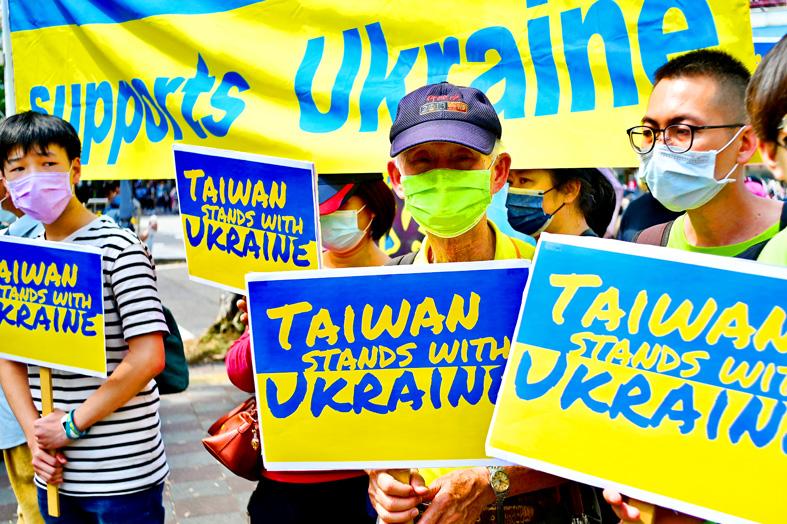A total of NT$743 million (US$26.2 million) has been raised in Taiwan in the 18 days since a government-designated account and an online funding platform were established to raise money to help refugees who have been forced to flee Ukraine following Russia’s invasion.
As of 8am yesterday, the account had received NT$587.32 million, while donations from an online payment platform reached NT$156.36 million, the Relieve Disaster Foundation said.
The foundation was commissioned by the Ministry of Foreign Affairs to operate the donation drive and ensure that its humanitarian goals are met.

Photo: Sam Yeh, AFP
The drive is being overseen by the central bank, the Financial Supervisory Commission and the Ministry of Finance, the foundation said.
Banking service charges are being refunded by the foundation for funds that are transferred into the donation account before noon on April 1, when the drive ends, it said.
The foundation encourages the public to contribute through its account at the Land Bank of Taiwan (code 005; account number 102-005-124-619), which is registered under the name “Relieve Disaster Foundation.”
Donations can also be made on the funding platform wabay.tw/projects/twuk, it added.
Donations made at convenience stores and virtual ATMs can be accepted until March 27, the foundation said.
A significant portion of the funds has been earmarked for medical aid and resettlement for Ukrainian refugees, as well as to purchase daily necessities.
The foundation has pledged NT$1 billion as a goal to ease the financial burdens of countries many refugees have fled to, particularly Poland and Slovakia, a foundation official said, adding that agencies in host countries have been wired NT$450 million.
The foundation would make public regular financial reports in accordance with the Charity Donations Act (公益勸募條例), the official added.

Taiwan is stepping up plans to create self-sufficient supply chains for combat drones and increase foreign orders from the US to counter China’s numerical superiority, a defense official said on Saturday. Commenting on condition of anonymity, the official said the nation’s armed forces are in agreement with US Admiral Samuel Paparo’s assessment that Taiwan’s military must be prepared to turn the nation’s waters into a “hellscape” for the Chinese People’s Liberation Army (PLA). Paparo, the commander of the US Indo-Pacific Command, reiterated the concept during a Congressional hearing in Washington on Wednesday. He first coined the term in a security conference last

Prosecutors today declined to say who was questioned regarding alleged forgery on petitions to recall Democratic Progressive Party (DPP) legislators, after Chinese-language media earlier reported that members of the Chinese Nationalist Party (KMT) Youth League were brought in for questioning. The Ministry of Justice Investigation Bureau confirmed that two people had been questioned, but did not disclose any further information about the ongoing investigation. KMT Youth League members Lee Hsiao-liang (李孝亮) and Liu Szu-yin (劉思吟) — who are leading the effort to recall DPP caucus chief executive Rosalia Wu (吳思瑤) and Legislator Wu Pei-yi (吳沛憶) — both posted on Facebook saying: “I

Sung Chien-liang (宋建樑), who led efforts to recall Democratic Progressive Party (DPP) Legislator Lee Kun-cheng (李坤城), was released on bail of NT$80,000 today amid outcry over his decision to wear a Nazi armband to questioning the night before. Sung arrived at the New Taipei District Prosecutors’ Office for questioning in a recall petition forgery case last night wearing a red armband bearing a swastika, carrying a copy of Adolf Hitler’s Mein Kampf and giving a Nazi salute. Sung left the building at 1:15am without the armband and covering the book with his coat. Lee said today that this is a serious

A mountain blaze that broke out yesterday morning in Yangmingshan National Park was put out after five hours, following multi agency efforts involving dozens of fire trucks and helicopter water drops. The fire might have been sparked by an air quality sensor operated by the National Center for High-Performance Computing, one of the national-level laboratories under the National Applied Research Laboratories, Yangmingshan National Park Headquarters said. The Taipei City Fire Department said the fire, which broke out at about 11am yesterday near the mountainous Xiaoyoukeng (小油坑) Recreation Area was extinguished at 4:32pm. It had initially dispatched 72 personnel in four command vehicles, 16